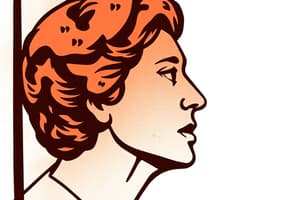Podcast
Questions and Answers
What was the title of Hannah Arendt's dissertation?
What was the title of Hannah Arendt's dissertation?
What was the name of the Jewish philosopher who became Hannah Arendt's first husband?
What was the name of the Jewish philosopher who became Hannah Arendt's first husband?
What was the title of Hannah Arendt's first article on Judaism?
What was the title of Hannah Arendt's first article on Judaism?
What was the name of the philosopher Hannah Arendt studied under at the University of Marburg?
What was the name of the philosopher Hannah Arendt studied under at the University of Marburg?
Signup and view all the answers
What was the name of the organization Hannah Arendt worked for in Paris, helping Jewish refugees emigrate to Palestine?
What was the name of the organization Hannah Arendt worked for in Paris, helping Jewish refugees emigrate to Palestine?
Signup and view all the answers
What is Hannah Arendt best known for?
What is Hannah Arendt best known for?
Signup and view all the answers
What was the name of Hannah Arendt's last work, left unfinished at the time of her death?
What was the name of Hannah Arendt's last work, left unfinished at the time of her death?
Signup and view all the answers
What was the name of the controversial trial that Hannah Arendt covered as a journalist?
What was the name of the controversial trial that Hannah Arendt covered as a journalist?
Signup and view all the answers
What was the name of the university where Hannah Arendt taught as a visiting scholar?
What was the name of the university where Hannah Arendt taught as a visiting scholar?
Signup and view all the answers
Study Notes
Hannah Arendt: German-American Political Theorist and Philosopher
-
Hannah Arendt was a German-born American historian and political philosopher.
-
She was born to a Jewish family in Linden, Prussia, in 1906, and her family moved to the East Prussian capital of Königsberg when she was three.
-
Arendt studied at the University of Marburg under Martin Heidegger, with whom she had a four-year affair, and obtained her doctorate in philosophy at the University of Heidelberg in 1929.
-
In 1933, the year Adolf Hitler came to power, Arendt was arrested and briefly imprisoned by the Gestapo for performing illegal research into antisemitism, and she fled Germany, living in Czechoslovakia and Switzerland before settling in Paris.
-
Arendt was stripped of her German citizenship in 1937, divorced her first husband in the same year, and then married Heinrich Blücher in 1940.
-
When Germany invaded France that year, she was detained by the French as an alien, but she escaped and made her way to the United States in 1941 via Portugal.
-
She settled in New York, where she became a writer and editor and worked for the Jewish Cultural Reconstruction, becoming an American citizen in 1950.
-
With the publication of The Origins of Totalitarianism in 1951, her reputation as a thinker and writer was established, and a series of works followed.
-
Arendt's works cover a broad range of topics, but she is best known for those dealing with the nature of power and evil, as well as politics, direct democracy, authority, and totalitarianism.
-
In the popular mind, she is best remembered for the controversy surrounding the trial of Adolf Eichmann and her attempt to explain how ordinary people become actors in totalitarian systems, which was considered by some an apologia, and for the phrase "the banality of evil".
-
Arendt taught at many American universities, while declining tenure-track appointments, and died suddenly of a heart attack in 1975, at the age of 69, leaving her last work, The Life of the Mind, unfinished.
-
She is commemorated by institutions and journals devoted to her thinking, the Hannah Arendt Prize for political thinking, and on stamps, street names, and schools, amongst other things.Life and Career of Hannah Arendt
-
Hannah Arendt had a romantic relationship with philosopher Martin Heidegger while she was a student in Marburg, but they kept it secret and only their letters revealed it.
-
In Marburg, Arendt had Jewish friends, including Hans Jonas and Gunther Siegmund Stern, who later became her first husband.
-
Arendt wrote an autobiographical piece called "Die Schatten" (The Shadows) in 1925, addressed to Heidegger, revealing her insecurities relating to her femininity and Jewishness.
-
Arendt completed her dissertation at Heidelberg University in 1929, under Karl Jaspers, and remained a lifelong friend of him and his wife.
-
Arendt's thesis was entitled "On the concept of love in the thought of Saint Augustine: Attempt at a philosophical interpretation."
-
Arendt married Gunther Stern in 1929 and spent two years wandering around Germany in search of academic appointments for Stern, with no success.
-
Arendt became increasingly involved in politics and started studying political theory, reading Marx and Trotsky, while developing contacts at the Deutsche Hochschule für Politik in Berlin.
-
Arendt published her first article on Judaism, "The Enlightenment and the Jewish Question," in 1932, and was critical of the women's movement.
-
Arendt was troubled by reports that Heidegger was speaking at National Socialist meetings in 1932 and wrote to him, asking him to deny it, but he did not.
-
Arendt stayed in Germany to become an activist after Stern fled to Paris in 1933, using her apartment as an underground railway way-station for fugitives.
-
Arendt adopted the concept of Jew as Pariah and took a public position against the rising Nazi Party by publishing a biography of Rahel Varnhagen.
-
Arendt was arrested by the Gestapo in 1933 but was released due to the intervention of friends and family, which led her to flee to Paris.
-
Arendt worked for the Jewish Agency in Paris and helped Jewish refugees emigrate to Palestine before escaping to the United States in 1941.Hannah Arendt was a German-Jewish philosopher and political theorist who lived from 1906 to 1975. She fled Nazi Germany in 1933 and spent the rest of her life in exile. While in Paris, Arendt worked for Zionist organizations and helped Jewish refugees. In 1941, she fled to the United States, where she became a naturalized citizen. Arendt wrote extensively on totalitarianism, politics, and the human condition. Her most famous work, The Origins of Totalitarianism, was published in 1951. Arendt taught at several universities but refused tenure-track positions. She was a visiting scholar at the University of Notre Dame, the University of California, Berkeley, Princeton University, and Northwestern University. She was also a professor at the New School for Social Research in Manhattan, New York City.Life, Work, and Philosophy of Hannah Arendt
-
Arendt was a member of the American Academy of Arts and Letters in 1964.
-
She was instrumental in the creation of Structured Liberal Education (SLE) at Stanford University in 1974.
-
Arendt had close friendships with male European philosophers and later with American literary figures and politicians.
-
She believed friendship was central to her life and to the concept of politics.
-
Arendt's beste Freundin varied, but she always had one throughout her life.
-
After Blücher's death, Mary McCarthy became Arendt's closest friend and confidante.
-
Arendt was a heavy smoker and sustained a near-fatal heart attack while lecturing in Scotland in 1974.
-
She died of a heart attack in 1975, shortly after her 69th birthday.
-
Arendt's work centers around political theory and intellectual history, using events and actions to develop insights into contemporary totalitarian movements.
-
Her political concept emphasizes civic engagement and collective deliberation.
-
Arendt's first major book, The Origins of Totalitarianism, examined the roots of Stalinism and Nazism.
-
Her most influential work, The Human Condition, differentiates political and social concepts, labor and work, and various forms of action.
Studying That Suits You
Use AI to generate personalized quizzes and flashcards to suit your learning preferences.
Description
Test your knowledge of the life, work, and philosophy of Hannah Arendt, the German-American political theorist, and philosopher. This quiz will cover her upbringing, education, relationships, and major works, including her analysis of totalitarianism and political theory. See how much you know about this influential figure who fled Nazi Germany and went on to become one of the most celebrated thinkers of the 20th century. Keywords: Hannah Arendt, German-American, political theory, philosophy, totalitarianism





